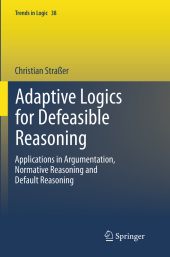 Neuerscheinungen 2016Stand: 2020-02-01 |
Schnellsuche
ISBN/Stichwort/Autor
|
Herderstraße 10
10625 Berlin
Tel.: 030 315 714 16
Fax 030 315 714 14
info@buchspektrum.de |

Christian Straßer
Adaptive Logics for Defeasible Reasoning
Applications in Argumentation, Normative Reasoning and Default Reasoning
Softcover reprint of the original 1st ed. 2014. 2016. xviii, 438 S. 34 SW-Abb. 235 mm
Verlag/Jahr: SPRINGER, BERLIN; SPRINGER INTERNATIONAL PUBLISHING 2016
ISBN: 3-319-34388-2 (3319343882)
Neue ISBN: 978-3-319-34388-4 (9783319343884)
Preis und Lieferzeit: Bitte klicken
This book presents adaptive logics (ALs) as an intuitive and powerful framework to model defeasible reasoning. It offers case studies stemming from various contexts of defeasible reasoning, such as default reasoning, argumentation, and normative reasoning.
This book presents adaptive logics as an intuitive and powerful framework for modeling defeasible reasoning. It examines various contexts in which defeasible reasoning is useful and offers a compact introduction into adaptive logics.
The author first familiarizes readers with defeasible reasoning, the adaptive logics framework, combinations of adaptive logics, and a range of useful meta-theoretic properties. He then offers a systematic study of adaptive logics based on various applications.
The book presents formal models for defeasible reasoning stemming from different contexts, such as default reasoning, argumentation, and normative reasoning. It highlights various meta-theoretic advantages of adaptive logics over other logics or logical frameworks that model defeasible reasoning. In this way the book substantiates the status of adaptive logics as a generic formal framework for defeasible reasoning.
Chapter 1. Introduction.- Part I. Adaptive Logics as a Framework for Defeasible Logics.- Chapter 2 The Standard Format of Adaptive Logics.- Chapter 3. Sequential Combinations of ALs.- Chapter 4. On the Transparency of Defeasible Logics: Equivalent Premise Sets, Equivalence of Their Extensions, and Maximality of the Lower Limit.- Chapter 5. Generalizing the Standard Format.- Part II. Conditional Logics of Normality.- Chapter 6. Adaptively Applying Modus Ponens in Conditional Logics of Normality.- Chapter 7. An Adaptive Logic for Rational Closure.- Part III. Argumentation Theory.- Chapter 8. Towards the Proof-Theoretic Unification of Dung´s Argumentation Framework: An Adaptive Logic Approach.- Chapter 9. Allowing for Joint Attacks.- Part IV. Deontic Logics.- Chapter 10. Avoiding Deontic Explosion by Contextually Restricting Modal Inheritance.- Chapter 11. An Adaptive Logic Framework for Conditional Obligations and Deontic Dilemmas.- Chapter 12. A Deontic Logic Framework Allowing for Factual Detachment.- Appendices.
"This is a book on the application of a class of logics, called adaptive logics, to a particular form of reasoning, in effect, of a defeasible kind. ... this book is clearly aimed at people interested in knowing the reaches of a formal logic formalism, from a philosophical viewpoint, without great concern for complexity and computational issues. And it may also serve a public with such computational concerns looking for an articulated starting point." (Marcelo Finger, Mathematical Reviews, April, 2016)


